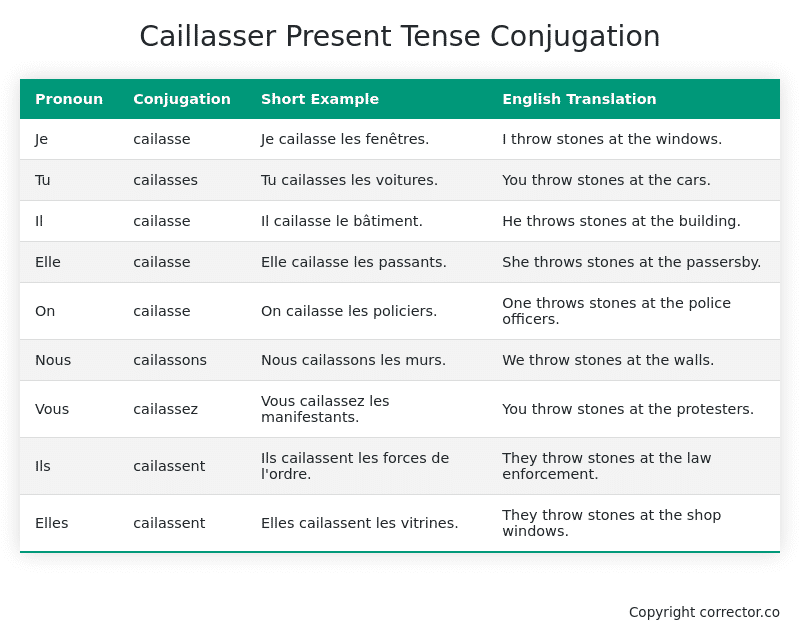Le Present (Present Tense) Conjugation of the French Verb caillasser
Introduction to the verb caillasser
The English translation of the French verb “caillasser” is “to stone.” The infinitive form “caillasser” is pronounced as /ka.ja.se/.
The word “caillasser” originates from the noun “caillou,” meaning “stone” in French. It is most often used to describe the act of throwing stones at someone or something, particularly in a violent or aggressive manner.
Here are three examples of how “caillasser” is used in everyday French:
- Les manifestants ont caillassé les policiers. (The protesters stoned the police officers.)
- Des voyous ont caillassé les voitures garées dans la rue. (Thugs stoned the cars parked on the street.)
- Les supporters ont caillassé le bus de l’équipe adverse. (The fans stoned the bus of the opposing team.)
Please note that “caillasser” is a strong verb with negative connotations, typically associated with acts of violence.
Caillasser – About the French Present Tense
To take a deep dive into all the French tenses then see our article on Mastering French Tense Conjugation.
Common Everyday Usage Patterns For Le Present
Interactions with Other Tenses
Table of the Present Tense Conjugation of caillasser
| Pronoun | Conjugation | Short Example | English Translation |
|---|---|---|---|
| Je | cailasse | Je cailasse les fenêtres. | I throw stones at the windows. |
| Tu | cailasses | Tu cailasses les voitures. | You throw stones at the cars. |
| Il | cailasse | Il cailasse le bâtiment. | He throws stones at the building. |
| Elle | cailasse | Elle cailasse les passants. | She throws stones at the passersby. |
| On | cailasse | On cailasse les policiers. | One throws stones at the police officers. |
| Nous | cailassons | Nous cailassons les murs. | We throw stones at the walls. |
| Vous | cailassez | Vous cailassez les manifestants. | You throw stones at the protesters. |
| Ils | cailassent | Ils cailassent les forces de l’ordre. | They throw stones at the law enforcement. |
| Elles | cailassent | Elles cailassent les vitrines. | They throw stones at the shop windows. |
Other Conjugations for Caillasser.
Le Present (Present Tense) Conjugation of the French Verb caillasser (You’re reading it right now!)
Imparfait (Imperfect) Tense Conjugation of the French Verb caillasser
Passé Simple (Simple Past) Tense Conjugation of the French Verb caillasser
Passé Composé (Present Perfect) Tense Conjugation of the French Verb caillasser
Futur Simple (Simple Future) Tense Conjugation of the French Verb caillasser
Futur Proche (Near Future) Tense Conjugation of the French Verb caillasser
Plus-que-parfait (Pluperfect) Tense Conjugation of the French Verb caillasser
Passé Antérieur (Past Anterior) Tense Conjugation of the French Verb caillasser
Futur Antérieur (Future Anterior) Tense Conjugation of the French Verb caillasser
Subjonctif Présent (Subjunctive Present) Tense Conjugation of the French Verb caillasser
Subjonctif Passé (Subjunctive Past) Tense Conjugation of the French Verb caillasser
Subjonctif Imparfait (Subjunctive Imperfect) Tense Conjugation of the French Verb caillasser
Subjonctif Plus-que-parfait (Subjunctive Pluperfect) Tense Conjugation of the French Verb caillasser
Conditionnel Présent (Conditional Present) Tense Conjugation of the French Verb caillasser
Conditionnel Passé (Conditional Past) Tense Conjugation of the French Verb caillasser
Conditionnel Passé II (Conditional Past II) Tense Conjugation of the French Verb caillasser
L’impératif Présent (Imperative Present) Tense Conjugation of the French Verb caillasser
L’impératif Passé (Imperative Past) Tense Conjugation of the French Verb caillasser
L’infinitif Présent (Infinitive Present) Tense Conjugation of the French Verb caillasser
L’infinitif Passé (Infinitive Past) Tense Conjugation of the French Verb caillasser
Le Participe Présent (Present Participle) Tense Conjugation of the French Verb caillasser
Le Participe Passé (Past Participle) Tense Conjugation of the French Verb caillasser
Struggling with French verbs or the language in general? Why not use our free French Grammar Checker – no registration required!
Get a FREE Download Study Sheet of this Conjugation 🔥
Simply right click the image below, click “save image” and get your free reference for the caillasser present tense conjugation!

I hope you enjoyed this article on the verb caillasser. Still in a learning mood? Check out another TOTALLY random French verb present conjugation!


